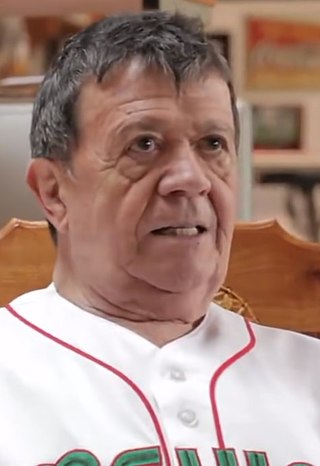Related Research Articles

Mario Fortino Alfonso Moreno Reyes, known by the stage name Cantinflas, was a Mexican comedian, actor, and filmmaker. He is considered to have been the most widely accomplished Mexican comedian and is celebrated throughout Latin America and in Spain as a popular icon. His humor, loaded with Mexican linguistic features of intonation, vocabulary, and syntax, is beloved in all the Spanish-speaking countries of Latin America and in Spain and has given rise to a range of expressions including cantinflear, cantinflada, cantinflesco, and cantinflero.

Emilio "El Indio" Fernández Romo was a Mexican film director, actor and screenwriter. He was one of the most prolific film directors of the Golden Age of Mexican cinema in the 1940s and 1950s. He is best known for his work as director of the film María Candelaria (1944), which won the Palme d'Or award at the 1946 Cannes Film Festival. As an actor, he worked in numerous film productions in Mexico and in Hollywood. He was the father of the Mexican actor Jaime Fernández.
Don't Fool Yourself Dear is a 1937 Mexican comedy-drama film directed by Miguel Contreras Torres and starring Carlos Orellana. It is the first full-feature film of Mexican comedian Cantinflas after becoming a star of the carpa circuit. It was also one of the earliest films of Orellana and Sara García and the first where they share the screen.

Teatro de los Insurgentes is a theater located on Mexico City's Avenida de los Insurgentes. Opened in 1953, the theater seats 959 spectators.

The Three Musketeers is a 1942 Mexican comedy film directed by Miguel M. Delgado and starring Cantinflas. It is based on the 1844 novel of the same name by Alexandre Dumas.

Su Excelencia is a 1967 Mexican political satire film directed by Miguel M. Delgado and starring Cantinflas and Sonia Infante. The film is set in a parody universe where "Red" and "Green" countries are the political equivalents of the socialist and capitalist countries of the Cold War, which the film satirizes. Cantinflas portrays Lupitos, a chancellor stationed in his country's embassy in the communist country of Pepeslavia who later ascends to the role of ambassador and has to decide the pivotal vote of joining the "Reds" or the "Greens", therefore deciding the fate of the entire world.

Xavier López Rodríguez, known professionally as Chabelo, was a Mexican actor, comedian, television presenter and children's music singer. In addition to his television career, Chabelo appeared in more than thirty motion pictures and recorded more than thirty musical albums. He produced shows including La Cuchufleta, La Güereja Quiere Más and En Familia con Chabelo, the latter of which was broadcast every Sunday morning on Televisa's Canal de las Estrellas. It aired for 47 years and consisted of contests with people from the audience, gifts and games and was mainly for children. The program ended on 20 December 2015. At the time of his death, he was one of the last surviving stars from the Golden Age of Mexican cinema.
El bolero de Raquel is a 1957 Mexican comedy film directed by Miguel M. Delgado and starring Cantinflas, Manola Saavedra, Flor Silvestre, and child actor Paquito Fernández. The film's art direction was by Gunther Gerszo.
La presidenta municipal is a 1975 Mexican comedy film directed by Fernando Cortés and starring María Elena Velasco, Adalberto Martínez "Resortes", and Pancho Córdova. The film was shot at Tlayacapan, Morelos, Mexico.

La cigüeña distraída is a 1966 Mexican comedy film directed by Emilio Gómez Muriel and starring the double act Viruta y Capulina, performed by Marco Antonio Campos and Gaspar Henaine.

Comedy in the Golden Age of Mexican Cinema is a Mexican film that was popular during "El Porfiriato" which represents the reign of Porfirio Díaz as dictator in Mexico.

Alma Delia Susana Fuentes González was a Mexican actress of film, television, and theatre.
The Magician is a 1949 Mexican comedy film directed by Miguel M. Delgado and starring Cantinflas, Leonora Amar and José Baviera. The film tells the story of lookalike hired from an agency to take the place of a magician who has gone on holiday.
The Photographer or Mr. Photographer is a 1953 Mexican comedy thriller film directed by Miguel M. Delgado and starring Cantinflas, Rosita Arenas and Ángel Garasa.
The Doorman, also known as Puerta, joven, is a 1950 Mexican comedy film directed by Miguel M. Delgado and starring Cantinflas and Silvia Pinal.
Drop the Curtain is a 1955 Mexican comedy film directed by Miguel M. Delgado and starring Cantinflas, Christiane Martel and Beatriz Saavedra. The film's art direction was by Gunther Gerszo.
Un Quijote sin mancha is a 1969 Mexican comedy film directed by Miguel M. Delgado and starring Cantinflas, Ángel Garasa, Lupita Ferrer and Susana Salvat. The title is a pun on the title of the novel Don Quixote of La Mancha.
Conserje en condominio is a 1974 Mexican comedy film directed by Miguel M. Delgado and starring Cantinflas, Claudia Islas and Raquel Olmedo.
El barrendero is a 1982 Mexican comedy film directed by Miguel M. Delgado and starring Cantinflas and María Sorté. It has been cited as an example of a "Mexploitation" film. It is Cantinflas's last film, ending a career that had lasted since 1936.